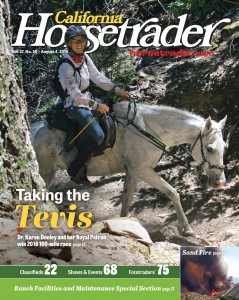 AUBURN — Although they race against a clock, time is an ally to Dr. Karen Donley and her Arabian mare, Royal Patron. Like fine wine, they improve with age.
AUBURN — Although they race against a clock, time is an ally to Dr. Karen Donley and her Arabian mare, Royal Patron. Like fine wine, they improve with age.
Since Dr. Donley purchased “Winnie” eight years ago, they have logged about 50 miles a week in a partnership that last month took endurance riding’s greatest prize, a win at the Tevis Cup. It may have been a 100-mile race, but the journey was much longer.
This year’s version of the venerable one-day race along the challenging Great Western States Trail took place July 23, attracting 165 riders from 20 states and nine countries. Horse-and-rider pairs take off at 5:15 a.m. with only 24 hours to finish a course that features 21,000 feet of descent and 17,000 feet of climbing. A dozen vet checks along the route inspect each horse with an acute focus on their condition, inspecting heart rate, metabolism, and soundness.
Just 87 of them finished — none faster than Dr. Donley and Winnie, who crossed the finish at 9:48 p.m. after 16 hours, 33 minutes. It was the duo’s fifth completion is an many tries, and their first title.
“We have made some mistakes every year, and we corrected them,” said Dr. Donley, of Mountain Center. “This year was very similar to other years, but everything went right as planned. Little things could have happened, but thank goodness, nothing did.”
Dr. Donley, an obstetrician at the Eisenhower Medical Center in La Quinta, began riding as an adult just a few years before she and her husband, Ron, acquired Winnie from Barbara Fredy of Anza. After taking basic lessons at a stable, she was drawn to Arabians and trail riding, and it wasn’t long before the lifelong runner discovered endurance riding.
“I already liked endurance-type events, and I enjoyed being out on the trail,” she said. “We logged a lot of miles. The bonding you have with your horse when you’ve been logging so many miles, going so many places together, is remarkable. You really want to be able to trust your horse. We’ve had rides on the ocean where you have a mare seeing the ocean for the first time and she keeps going for you. It’s pretty special.”
Western States Trail Foundation President Tony Benedetti, who competed in his 41st Tevis this year and was in the Top 10, says the traits of an endurance rider are clearcut, and Dr. Donley fits the profile.
“First, they are in this sport because they love horses,” said Benedetti, who competed in his first Tevis at age 13, in the footsteps of his mother, an endurance rider. “Secondly, obviously, it is an endurance sport, and they love the endurance athletic ability of these horses. Most of your endurance riders are very goal-driven. You taken those factors — loving horses, being goal-driving, liking athletic competition — I think those three traits are what drive people to do this.”
He adds that those also are the things that make for a fun horse-rider partnership that builds over time, leading to achievements with your horse.
“For example, Karen has done five Tevis, and she kept coming back — always in the Top 10 or close,” he added. “And she just kept coming back and coming back until she kind of figured it out and had the right day.”
Dr. Donley says the difference-maker this year was careful pacing at certain points along the challenging route. The plan was to keep her mare from overexertion that might push her into an unfit feeling that would deter continual drinking and eating along the way. Water and food consumption is a critical element that, when stymied, can lead to being detained at vet checks — or worse — pulled from the race. Heart rates must be below 64, and gut checks throughout the race determine whether the horse is properly metabolizing.
The race was a family affair, as her 18-year-old son, J.J., competed in his sixth Tevis alongside his mother. They were together until a vet check at the 85th mile, where J.J. had to pull from the race. Mom rode on to victory.
“We paced a little better as far as in the canyons,” Dr. Donley said. “It’s a huge management decision, how fast to go to keep your horse good for the future miles. We may have been a little better conditioned this year over previous years, but I think it was more that they were better managed. On the difficult sections, going a little slower, so they always felt good. We never got to a point where they didn’t feel good, so they would constantly eat and drink.”
Her son’s departure in his first ride in the adult division was a blow, but he proved resilient.
“I was very disappointed that J.J. was pulled,” she said. “It’s very difficult for the vets because they are trying to anticipate what horse can get into trouble. We both knew that his horse was fine, but they didn’t know that. On the other hand, he took it so well, that it was fine.”
As for Winnie, she was proud.
“She’s been so good for so many years,” Dr. Donley said. “The only difference was this year she was managed so much better, so that she felt really well all day.”
MORE ONLINE: Http://bit.ly/608A_Tevis
Leave a Comment
All fields must be filled in to leave a message.